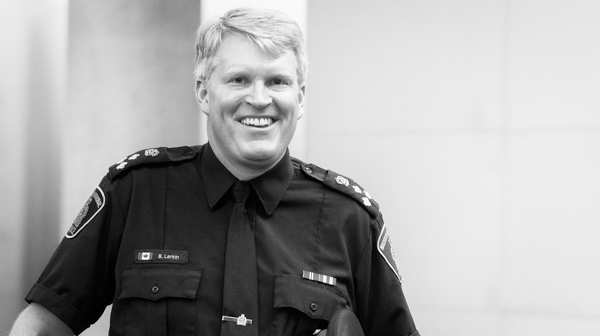

That’s how I describe the University of Guelph-Humber: it was a very important part of my journey of leadership."
University of Guelph-Humber Justice and Public Safety alumnus Bryan Larkin still remembers where he was when he decided he wanted to become a police officer: in his Montreal kindergarten classroom, listening intently to friendly Officer Bernie as he discussed road safety, stranger danger, and other topics relevant to young kids.
Larkin found Officer Bernie to be approachable and caring, and as he grew up, Larkin made a habit out of chatting with police officers to find out more about what life in uniform was like. Specifically, he always found himself interested in what leadership meant to them.
Now, as Chief of Police for the Waterloo Regional Police and the President of the Canadian Association of Chiefs of Police, Chief Larkin has an opportunity to be a leader not just in his community, but within the national policing community as a whole.
“For me, my goal of getting into policing was always about serving the community, making a difference, and keeping people safe,” Chief Larkin recalls. “From a very young age, I just caught this bug. I just turned 50 and now I’m at the point in my leadership journey where my focus is on growing the future of policing, mentoring, providing opportunities, and opening doors for people from diverse backgrounds.
“I never set out to be the Chief of Police, but I always knew the role of a police officer was for me.”
And after spending his whole early life looking up to police, being Chief of Police – especially at a time when there are such passionate discussions about the role of police in society – is not a responsibility that Chief Larkin takes lightly.
“To have the opportunity to be a Chief of Police at this pivotal moment in policing is a tremendous honour, and with it comes great responsibility of advocacy, change, acknowledgment, and a lot of self-reflection,” Chief Larkin said. “We have to acknowledge systemic racism does exist in our institutions. For Black people, Indigenous people and other people of colour, it’s been a slow, long journey and we clearly need to do better.
“But that’s the exciting part of it: How do we evolve, modernize and reshape policing in Canada?”
In fact, those debates that are raging now remind Chief Larkin of the debates he used to relish participating in at the University of Guelph-Humber. It’s not an exaggeration to say that those conversations were a formative experience for him.
A mature student
Chief Larkin was in his early 20s when he first got hired as a police officer in 1991. He had accomplished one major life goal, but another still eluded him: he had always wanted a university education.
When he heard about the University of Guelph-Humber’s Justice & Public Policy program, it seemed like the perfect fit. A Sergeant in the recruiting unit of the Waterloo Regional Police at the time, Chief Larkin liked that the program was flexible and would allow him to continue to work full-time.
“I was at a point in policing where my mind needed stimulation and divergent thought,” he said. “I felt the timing was just perfect to grow and move forward. There was this tremendous opportunity to take what I was learning in the symposiums and classrooms and apply that to the real-life police work I was doing.”
As he progressed through the program, Chief Larkin was also climbing the ladder in his professional life – he was promoted to Staff Sergeant then Inspector before being named Superintendent of the Kitchener division after graduation – and the work he was doing in the classroom became even more relevant.
“It was in many ways a perfect storm because the work I was doing was very much based on public policy. It was very valuable to me to gain a better understanding of justice and crime and how it interrelates with financial budgeting and the demands of police budgets. It just gave me a wide range of knowledge.”
Chief Larkin left Waterloo to serve as first Deputy Chief of Police and then Chief of Police of the Guelph Police, before eventually being lured back to Waterloo and his current position.
He was also honoured to be named President of the Canadian Chiefs of Police, given that he was appointed by his peers.
“It’s extremely humbling,” he said.
Coming full circle
Chief Larkin has remained part of the University of Guelph-Humber community as an alumnus. He’s a frequent guest speaker (now virtually) and relishes the opportunity to be back in a UofGH classroom.
“I’ve maintained a connection to the University of Guelph-Humber and the University of Guelph,” he said. “I like to engage in dialogue and town-hall sessions because it was a big part of my foundation and my growth as a mature student. When you get into an academic setting and you’re challenged by professors, you’re challenged on logic, you’re challenged on policy, it builds a better outcome for everybody.
“I felt UofGH was a safe setting. You could have really candid dialogue and even debate on justice and policy issues,” he added. “I’ve recommended many people go through the program, including colleagues and peers. I took so much from it.”
In fact, he specifically recalls an interesting thought that crossed his mind when he once was addressing a group of University of Guelph-Humber students.
“One of the things I enjoy when I go to UofGH is that you’re in the auditorium and you see this group of 60 diverse, really engaged students. The special thing for me is that someone in that room is likely to become a Chief of Police and they don’t even know. They’re on a journey of leadership.
“That’s how I describe the University of Guelph-Humber: it was a very important part of my journey of leadership.”







